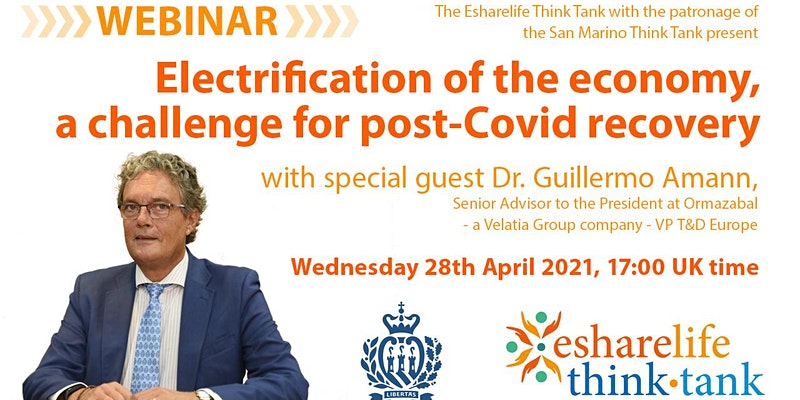On 28 April 2021 San Marino Think Tank in close collaboration with Esharelife Think Tank organised a webinar with Dr Guillermo Ammann, who made a presentation about ‘Electrification of the economy, a challenge for post-Covid recovery’.
Dr Guillermo Amann holds a PhD in electrical power engineering, and currently is serving as Senior Advisor to the President at Ormazabal- a Velatia Group company which is specialised in medium voltage product systems covering a wide range of products, solutions, and services for electricity distribution networks. Also, he is Chair of the Spanish Association of Electrical Equipment Manufacturers (AFBEL) and Vice-President and member of the Executive Committee of the European Association of electricity transmission and distribution and Equipment and services industry (T&D EUROPE) located in Brussels.
Dr Amann started his presentation with a historical overview of the electrification process and presented to the participants the two founding fathers of electrical engineering: Nikola Tesla and Thomas Edison, who respectively contributed to the development of the alternating-current and of the direct-current electric power systems.
Thereafter, Dr Amann elaborated 3 main processes of electrification: generation, transmission & distribution, and consumption. Concerning the generation, we are facing a shift from conventional to renewable sources. Nuclear, oil, coil, and gas power plants are being gradually replaced by renewable sources such as water, solar, and wind power plants. Regarding the transmission of energy, he stated that today we have better technologies and materials compared to the past. This allows to strongly reduce energy dispersion along the distribution lines. The new frontier in this field is represented by the automatization and the involvement of IT in facilities.
A central part of Dr Amann’s presentation to the participants was dedicated to the new concept of electric grid. He stressed the view that while in the past there was a centralised system that involved a unique energy production site and a plurality of different users, today we face a situation where more and more consumers are becoming “prosumers”. This means that many users do not anymore just consume energy, but they are able to become, for example by installing solar panels, energy producers themselves. This modern approach is characterised by decarbonization, digitalisation, and decentralisation. The closer the production is to the consumer, the more efficient the system is. This implies different technical issues and requires the implementation of new technologies such as the so-called “smart transformers”.
In regard to the EU manufacturers operating in the electricity sector, he shared the view that they do have top quality technologies, skills, and know-how that for sure represent a fundamental asset and a great opportunity to take a big step forward in support of sustainable development. These technologies will not only be applied in the EU, but also in the USA and in most advanced economies. This is good news for the EU manufacturers that will be able to increase production while creating new resilient job positions.
After the interesting presentation, a lively Q & A took place, where several participants asked their questions on the topic. Dr Amann shared his vast experience in answering questions about the political role in managing this transition towards new electrification of the economy; energy storage techniques, the role and the capacities of existing power grids to achieve net-zero emissions; the scarcity of key raw materials for the sector such as copper, etc. At the end of the Q & A session, Dr Amann in response to a question about the sustainable use of electricity, for example in mining bitcoins, expressed his concern about the need for more efficient use of electricity, and that innovation in the electricity sector should be driven by the real and genuine reasons.

